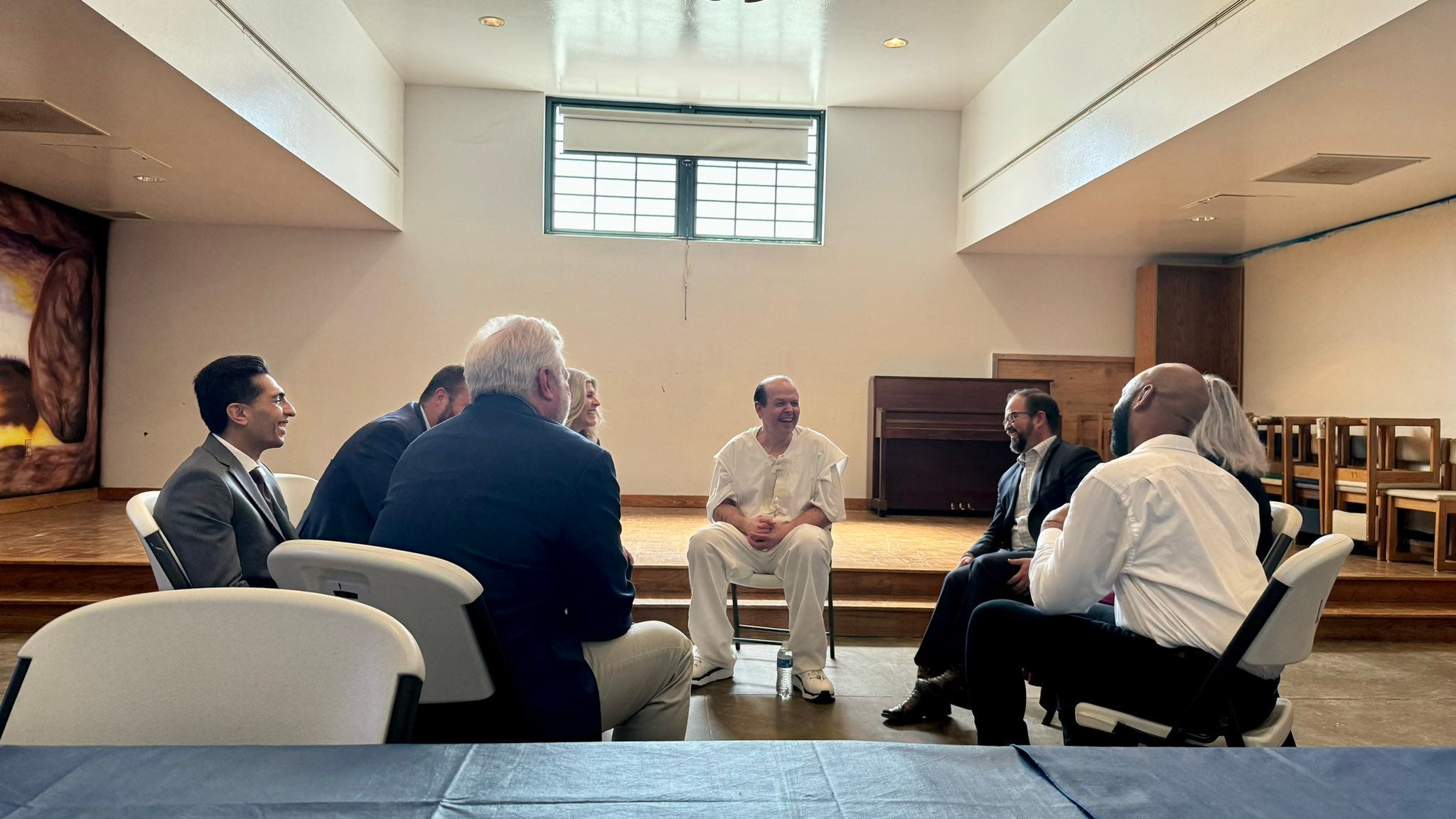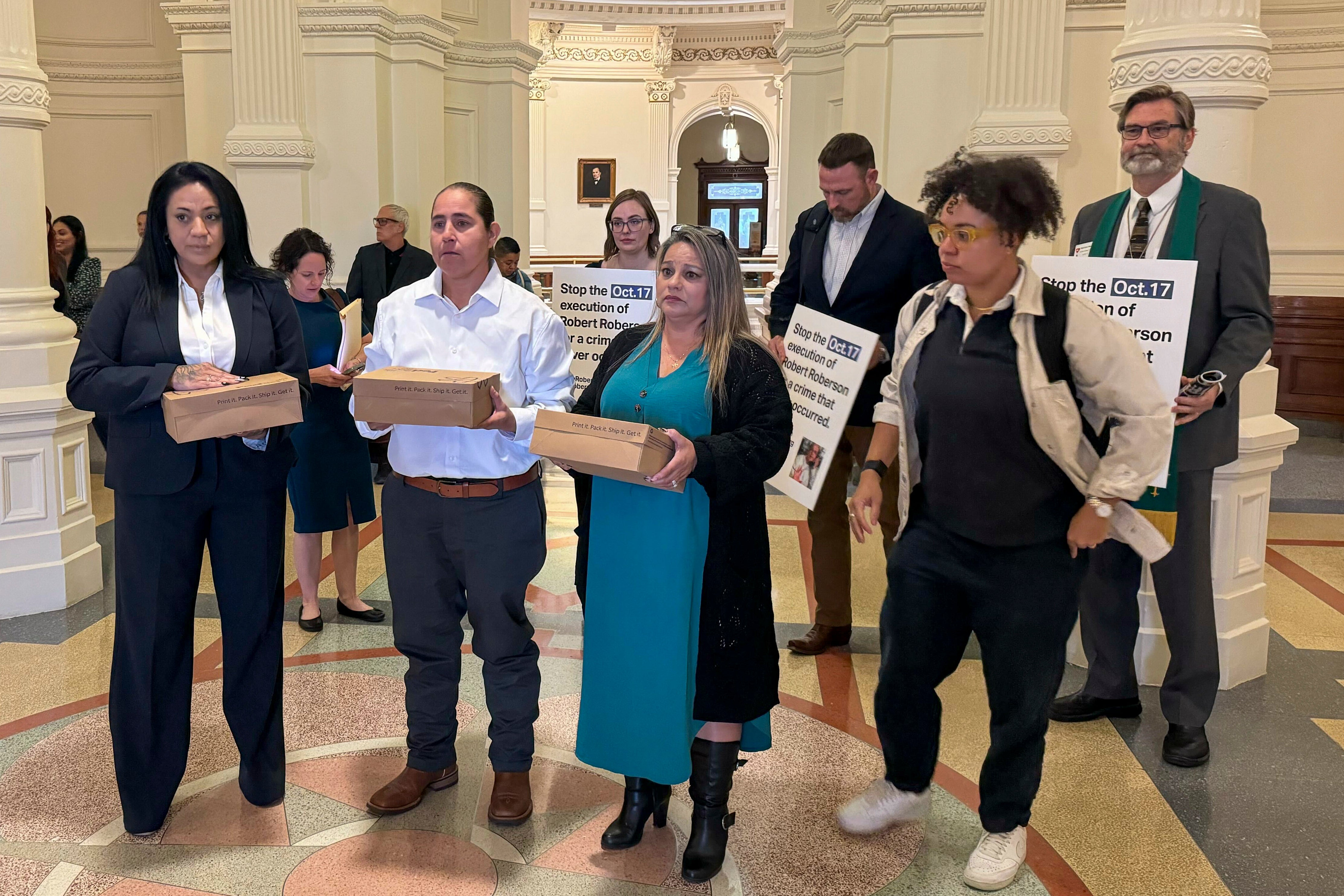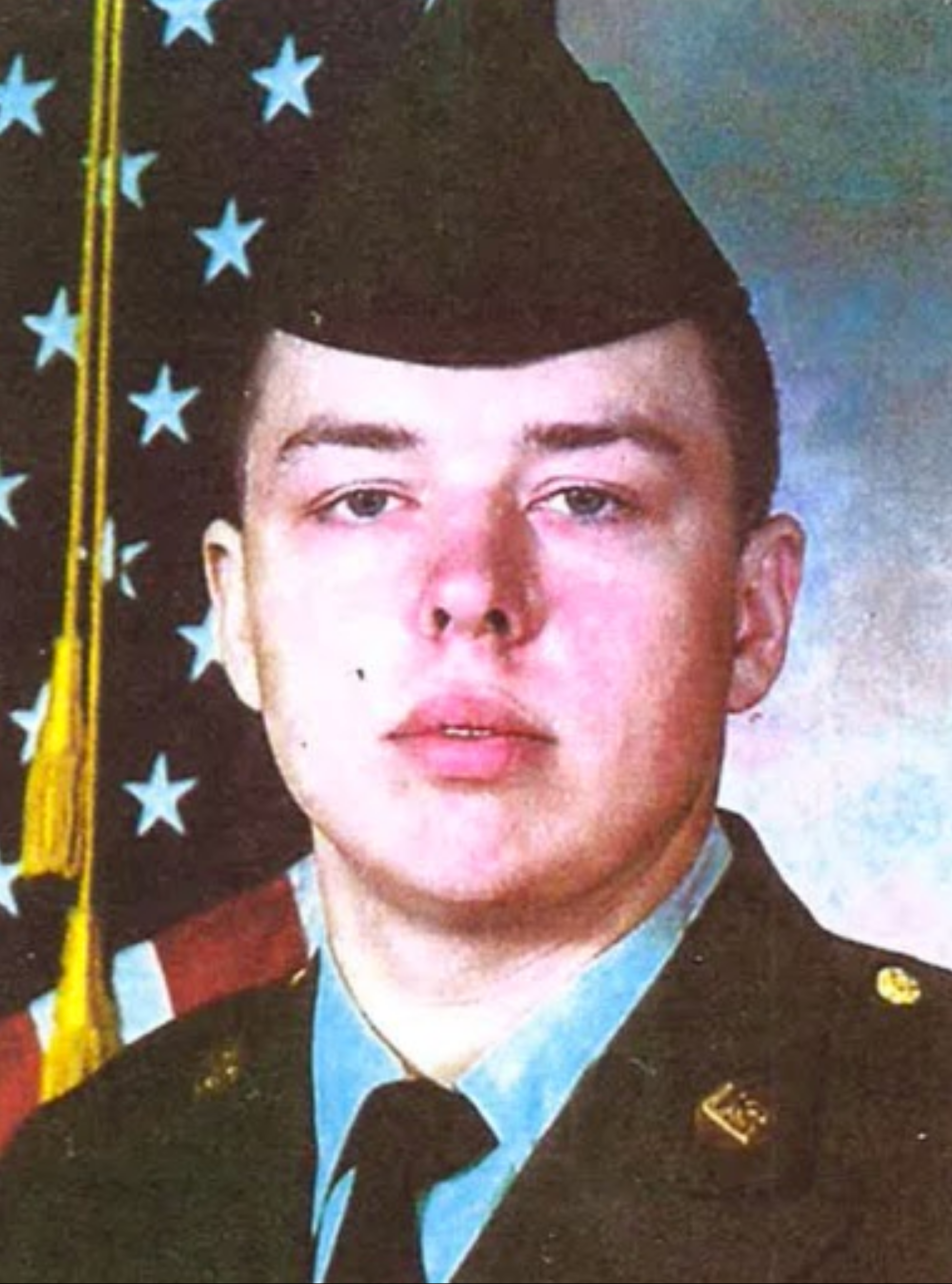Texas court issues last-minute decision blocking execution of father in ‘shaken baby syndrome’ case
“After being told about the stay, he praised God and thanked his supporters,” a spokeswoman said
Texas’s Supreme Court blocked the execution of a man who was set to die on Thursday, hours before the convicted killer’s execution warrant expired at midnight.
Robert Roberson, 57, was set to be executed around 6 p.m. at the Huntsville Unit in Huntsville, Texas, for the 2002 death of his two-year-old daughter Nikki Curtis.
However, late Thursday, the state’s highest court blocked the killing of Roberson - an autistic father at the center of a controversial “shaken baby syndrome” case. Three of the court’s judges said the case brought up a significant question on the separation of powers on which there is no clear precedent.
Amanda Hernandez, a spokeswoman for the Texas Department of Criminal Justice, told media outlets at a news briefing Roberson was “shocked” and “praised God and thanked his supporters.” The death row inmate was transported back to the Allan B. Polunsky Unit in Livingston. He had spent a large part of the day near an execution chamber awaiting his fate.
The decision was the latest in a string of last-minute legal maneuvers to delay the killing. Earlier in the day, a judge in Travis County, Texas, granted a temporary restraining order stopping the execution in connection with a subpoena issued by the Texas House of Representatives Committee on Criminal Jurisprudence.
A bipartisan group of lawmakers requested Roberson testify during a hearing set for October 21, in an effort to delay the execution.
In a dash against the clock, the Texas Attorney General’s Office appealed the court’s ruling in order to make sure the execution went ahead. The state criminal appeals court vacated the restraining order, also pressing for the execution to continue as planned. However, lawmakers who wanted to stop it then appealed that decision to the Texas Supreme Court, which granted the stay.
Speaking outside the Huntsville Unit, Republican State Representative Lacey Hull of Houston said she looked forward to welcoming Roberson to the Texas Capitol on Monday, adding: “I would love to see him get a new trial.”

Roberson would be the first person to ever be executed in connection to shaken baby syndrome, which has been widely discredited by scientists.
Prosecutors maintain that Roberson “brutally murdered his own child” by shaking and striking her, resulting in blunt-force trauma, court records show.
But a chorus of attorneys, medical experts and state legislators rejected that position, instead claiming that Nikki died from a combination of severe undiagnosed chronic viral pneumonia compounded by a secondary acute bacterial pneumonia that progressed to sepsis.
“In other words, there was no homicide,” a group of medical professionals wrote to the Texas Board of Pardons and Paroles, which voted against granting Roberson clemency on Wednesday. “Mr Roberson should not have been convicted, let alone convicted and sentenced to death.”
The parole board’s vote came during a hearing in the Texas House of Representatives on the case, which included testimony from medical experts, Roberson’s lead attorney, and Anderson County District Attorney Allyson Mitchell, who set Roberson’s execution date.
In a heated exchange with a legislator, viewed online by The Independent, Mitchell declined to say whether she was 100 percent certain Roberson murdered his child and said she would have to review the trial transcript before answering certain questions about the case. She admitted that the criminal justice system sometimes fails, but said she trusted the process in Roberson’s case.

Republican Representative Brian Harrison checked Mitchell. “To be clear, you trust in the process that one moment ago you admit sometimes does fail,” he said.
Following the parole board’s vote, Roberson’s attorneys filed a petition to stay the execution with the US Supreme Court, asking the judges to consider whether the Texas criminal appeals court denied him due process by refusing to consider new scientific and medical evidence of his innocence. The judges said the filing was not a federal matter.
Associate Justice Sonia Sotomayor wrote in a statement:“Because this Court is powerless to act without a colorable federal claim, and because the Texas Board of Pardons and Paroles declined to recommend clemency, only one remedy remains: an executive grant of a reprieve delaying Roberson’s execution by thirty days.”
Governor Greg Abbott has the power to issue the reprieve. The Independent has emailed his office for comment. He has not spoken out about the issue.
Days before his daughter’s death, Roberson took Nikki to the emergency room in Palestine, Texas as she’d been suffering from a respiratory infection, diarrhea and vomiting. A doctor prescribed Phenergan and Roberson took Nikki home. The next day, she developed a 104-degree fever and was given another dose of the medication combined with codeine, court records state.
The Federal Drug Administration no longer recommends the combination to children due to risks of induced breathing difficulties and death. Nikki had a long history of chronic health conditions, including breathing apnea, court records state.
Roberson later left the hospital with his daughter, took her home and put her to bed.
The following morning, he said he awoke to a strange cry and found Nikki on the floor at the foot of the bed. He said he comforted her and the two fell back asleep, court filings state. When he woke up later that morning, he said Nikki was unconscious with blue lips. He claims he tried to revive her and rushed her to the emergency room, but she already had signs of brain damage, including fixed and dilated eyes.

She was taken to the Children’s Medical Center in Dallas, where she died on February 1, 2002.
A pediatrician determined that abuse had played a factor in the girl’s death, after finding signs on her body typically associated with “shaken baby syndrome”, which include subdural hematoma, brain swelling and retinal hemorrhages. At the time, the medical community believed that the symptoms meant a child had been violently shaken, and possibly struck against a blunt surface. It’s now believed that other medical problems can result in the same symptoms.
The medical examiner ruled Nikki’s death a homicide. Medical and law enforcement professionals did not further investigate the incident or consider her prescribed medications and prior illnesses, court records detail. No one else was with Nikki at the time of her death, and Roberson had sole custody.
Nikki’s mother was homeless and addicted to drugs. Child Protective Services took her at birth, long before Roberson was identified as the girl’s father. She’d been with Roberson for less than a year.
Authorities charged Roberson with capital murder the day after she died. He was convicted the following year.
In 2013, Texas enacted Article 11.073, dubbed the “junk science statute,” enabling the review of wrongful convictions based on junk science. The law was the subject of a nine-day evidentiary hearing in March 2021 for Roberson’s case. The following year, the convicting court recommended against granting relief.

Last week, the Texas appeals court ruled that a Dallas man, who had been sentenced to 35 years in prison using the discredited science, deserved a new trial, claiming a jury would not convict him today with the same facts. Roberson’s prosecutors argued that the Dallas man’s case was different because the only evidence of any injury came from alleged shaking by the defendant.
On Wednesday, the appeals court denied an emergency motion and briefs related to Roberson on procedural grounds.
Brian Wharton, a former lead detective tasked with prosecuting Roberson, told The Independent he found him in a stoic state at the hospital, not acting as he thought a distraught father should. Roberson was diagnosed with autism in 2018, which Wharton now believes contributed to his demeanor.
It appeared to be a straightforward case, Wharton said. His doubts began to emerge during Roberson’s trial. He didn’t believe the defense was up to par, and suspected the jury had been tainted after the district attorney introduced child sexual assault charges that were later dropped.
After Roberson was sentenced to death, Wharton hoped the ruling would be overturned in appeals. He routinely checked for updates in the case.
“I was, in my own naive way, confident that the system that I was part of would check itself, and clearly it has made no effort to do so in the intervening years,” Wharton said in a phone interview. He no longer thinks the science used to charge Roberson is credible.
He left law enforcement in 2006 and is now a reverend in Onalaska, Texas.
When asked how he’d feel if Roberson is executed, he responded: “I’m so mad I could spit nails.
“Oh gosh, the grief. This is the deepest part of my shame. I visit him now and I don’t remember seeing him then the way I see him now. He is a kind and gentle man, a gracious man, a joyful man, a hopeful man.
“There is no kind of meanness in him. There will be this tremendous grief that I had a hand in killing something so beautiful.”

